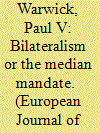| Srl | Item |
| 1 |
ID:
094957


|
|
|
|
|
| Publication |
2010.
|
| Summary/Abstract |
Michael McDonald and Ian Budge have recently advanced an interpretation of democratic governance based on what they term the 'median mandate'. This perspective locates the key element of liberal democracy in a close correspondence between government policy and the policy preferences of the median voter on the left-right scale. The cross-national evidence they produce in favour of this interpretation is impressive, but it largely hinges on a method for measuring the median voter position in each election that relies on the positions of the various parties in the election and the vote shares they received. This article examines the validity of the median mandate hypothesis when median positions are measured more directly from public opinion surveys (particularly, the Eurobarometer and Comparative Study of Electoral Systems series). The findings show that choice between distinct alternatives, rather than conformity to the median, more accurately characterises governance in democratic systems.
|
|
|
|
|
|
|
|
|
|
|
|
|
|
|
|
| 2 |
ID:
111499


|
|
|
|
|
| Publication |
2012.
|
| Summary/Abstract |
The preceding article by Best, Budge and McDonald acknowledges much of the substance of the alternative 'bilateralist' interpretation of democratic governance I advocated and attempts to re-focus the median mandate approach towards a longer-term, and potentially more productive, understanding of the opinion-policy relationship. Both are welcome developments. Despite taking these steps, however, the authors choose to allow the fate of the median mandate thesis to rest ultimately on an attempt to re-establish the short-term one-to-one relationship that I challenged. In this brief note, I argue that this not only undercuts the more positive initiatives noted above, but also is based on a flawed understanding of how the short-term relationship should be operationalised and tested.
|
|
|
|
|
|
|
|
|
|
|
|
|
|
|
|